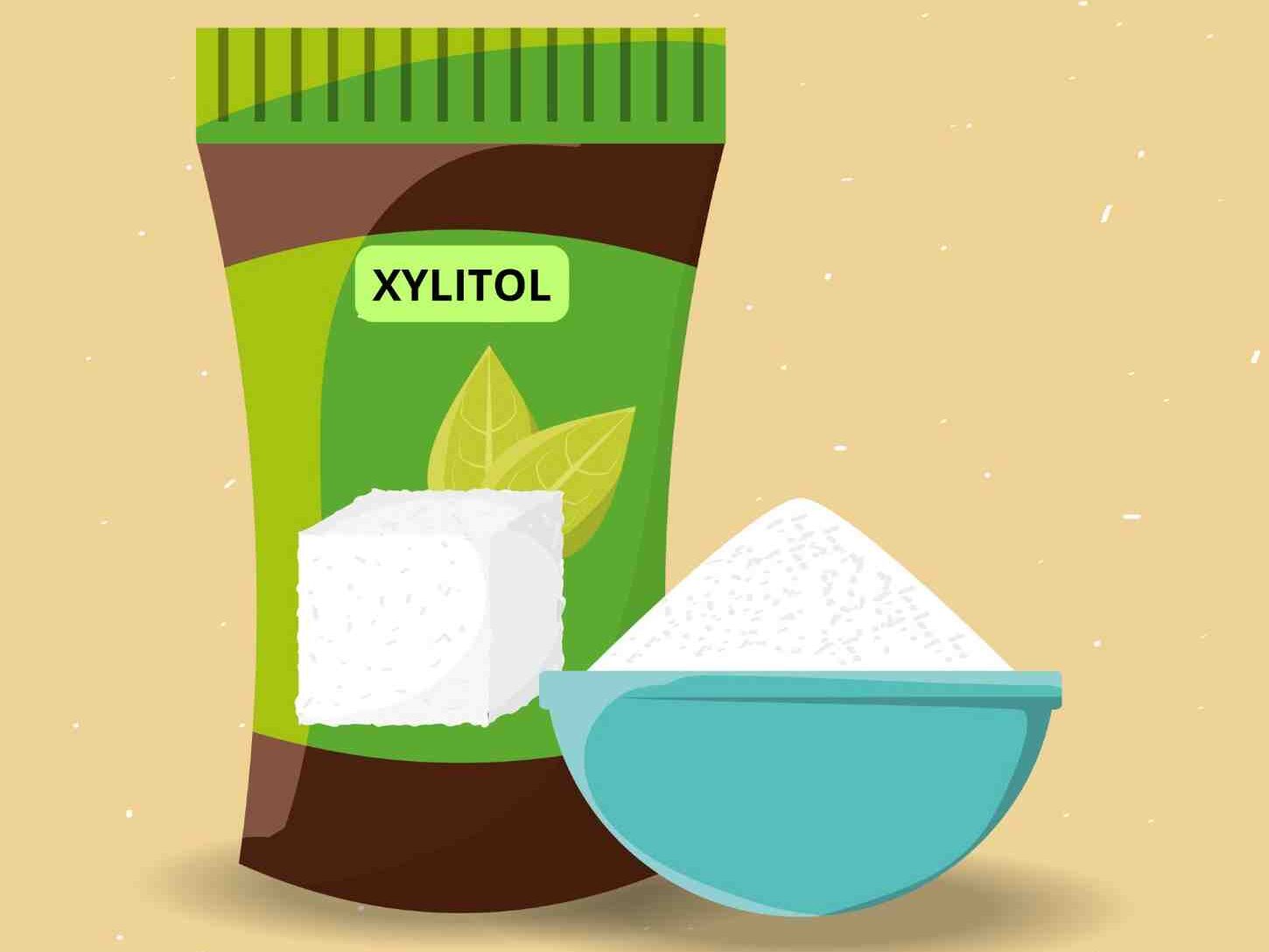Xylitol is a natural sweetener that has gained popularity among those looking to reduce sugar intake without sacrificing taste. As a sugar alcohol, xylitol provides sweetness similar to sugar but with fewer calories and a lower impact on blood sugar. Known for its benefits in promoting oral health and managing diabetes, xylitol has become a favorite ingredient in sugar-free products like gum and toothpaste.
What is Xylitol?
Xylitol is a naturally occurring sugar alcohol found in small amounts in fruits, vegetables, and trees like birch. It serves as a healthier alternative to sugar, offering a sweet taste without contributing to tooth decay or significant calorie intake. Unlike regular sugar, xylitol doesn’t raise blood sugar levels drastically, making it an excellent option for people with diabetes or those on low-carb diets.
Origins and Discovery
Chemists discovered xylitol in the late 19th century. However, it wasn’t until the mid-20th century that its benefits, especially in dental health, were fully recognized. Over time, xylitol became an essential ingredient in sugar-free products, offering both sweetness and health benefits.
- Naturally Sourced: Xylitol can be extracted from plants like birch trees and corn cobs.
- Chemically Produced: Manufacturers produce xylitol through a process known as hydrogenation, which converts plant-based xylose into xylitol.
Key Characteristics of Xylitol
- Low Glycemic Index: With a glycemic index of 7, xylitol has a minimal effect on blood sugar, unlike sugar, which has a GI of 60-70.
- Fewer Calories: Xylitol provides 2.4 calories per gram, significantly lower than sugar’s 4 calories per gram.
- Dental Health Benefits: Xylitol helps reduce the risk of cavities by neutralizing acids in the mouth and preventing bacterial growth.

Health Benefits of Xylitol
Xylitol isn’t just a sweetener. It offers multiple health benefits, making it a healthier choice compared to sugar.
Blood Sugar Control
One of xylitol’s major benefits is its ability to help control blood sugar levels. Since it doesn’t cause a sharp rise in glucose, xylitol is ideal for people with diabetes or those on a low-carb diet.
- Diabetic-Friendly: Xylitol has a much lower glycemic index than sugar, which means it doesn’t cause blood sugar spikes.
- No Insulin Surge: The body metabolizes xylitol with minimal insulin production, reducing strain on the pancreas.
Weight Management
By providing fewer calories than sugar, xylitol can play an essential role in weight management. People looking to cut back on calories while still enjoying sweet foods can benefit from using xylitol as a sugar substitute.
- Lower Caloric Value: With only 2.4 calories per gram, xylitol offers almost half the calories of sugar, making it a useful tool for reducing overall calorie intake.
- Reduces Sugar Cravings: Xylitol satisfies sweet cravings without causing the cravings and dependency often associated with sugar consumption.
Dental Health Benefits
Xylitol is well-known for its positive impact on dental health. Unlike sugar, which feeds harmful bacteria in the mouth, xylitol starves these bacteria, reducing the risk of cavities and promoting better oral hygiene.
- Fights Cavities: Regular consumption of xylitol can lower cavity-causing bacteria in the mouth.
- Protects Enamel: Xylitol helps to neutralize acids that erode tooth enamel, preventing tooth decay.
- Stimulates Saliva: Xylitol increases saliva production, which aids in washing away food particles and bacteria, promoting overall oral health.
Digestive Health
Although xylitol has numerous benefits, it’s important to note that large quantities can cause digestive issues, such as bloating or diarrhea. Like other sugar alcohols, xylitol ferments in the gut, which can lead to discomfort.
- Well-Tolerated in Small Amounts: Most people tolerate xylitol well when consumed in moderation. Gradual introduction into the diet can help avoid digestive discomfort.
- Potential Prebiotic Effects: In small amounts, xylitol may promote the growth of beneficial gut bacteria, supporting digestive health.
Xylitol vs. Regular Sugar
When compared to sugar, xylitol offers a range of benefits that make it the healthier choice. Here’s a closer look at how the two compare:
Calories and Glycemic Impact
- Sugar: Regular sugar provides 4 calories per gram and causes significant spikes in blood glucose and insulin.
- Xylitol: At 2.4 calories per gram and a low glycemic index, xylitol keeps blood sugar levels stable while providing sweetness.
Dental Health
- Sugar: Consuming sugar feeds harmful bacteria in the mouth, which produce acids that erode tooth enamel, leading to cavities.
- Xylitol: Xylitol reduces the ability of bacteria to stick to teeth, helping to prevent tooth decay and maintain a healthy mouth.
Weight Management
- Sugar: Excess sugar consumption contributes to weight gain, increased fat storage, and obesity-related health issues.
- Xylitol: With fewer calories, xylitol helps reduce overall caloric intake and supports weight management.
Common Uses of Xylitol
Xylitol’s unique properties make it a versatile sweetener, used in a wide variety of products. From food to dental care, xylitol is a valuable ingredient for people looking to reduce sugar consumption.
Food Products
- Sugar-Free Gum: One of the most common uses of xylitol is in sugar-free chewing gum, where it sweetens while promoting dental health.
- Low-Calorie Desserts: Xylitol is often used in low-calorie sweets, such as candies and ice creams, to reduce sugar content without sacrificing flavor.
- Baking: Xylitol can replace sugar in baked goods, providing a lower-calorie option for those looking to maintain a healthier diet.
Dental Products
- Toothpaste and Mouthwash: Xylitol is a common ingredient in toothpaste and mouthwash, where it helps protect teeth from decay while adding sweetness.
- Breath Mints: Many sugar-free breath mints use xylitol, not only to sweeten but also to freshen breath and fight bacteria.

Xylitol in Cooking and Baking
Xylitol’s versatility makes it a popular choice in both home kitchens and the food industry. It behaves much like sugar in most recipes, but there are a few key differences to consider when using it in cooking and baking.
Baking with Xylitol
Xylitol can replace sugar in most baking recipes at a 1:1 ratio, but it does come with some unique properties that bakers need to be aware of. Since xylitol doesn’t caramelize or brown like sugar, baked goods may not develop the same golden color you’re used to. Additionally, it retains less moisture, so some baked goods may come out drier than expected.
- Low-Calorie Alternative: Xylitol provides a lower-calorie option in cakes, cookies, and muffins, making it perfect for those watching their calorie intake.
- Texture Differences: Because xylitol doesn’t caramelize, baked goods might not brown as they would with sugar, and adjustments may be needed to maintain moisture levels.
- Substitute Ratios: Generally, you can substitute xylitol for sugar at a 1:1 ratio in most recipes.
Cooking with Xylitol
In savory dishes, xylitol adds subtle sweetness without overpowering the flavors. It’s ideal for salad dressings, sauces, and marinades, allowing you to create flavorful dishes while keeping the calorie count low.
- Great for Sauces and Dressings: Xylitol sweetens dressings and marinades without adding sugar’s calories or blood sugar spikes.
- Ideal for Low-Sugar Diets: For those following low-sugar or ketogenic diets, xylitol offers a way to enjoy sweet and savory meals without compromising health goals.
Xylitol in Beverages
Xylitol works well in a variety of beverages, from hot drinks like coffee and tea to cold drinks like smoothies and lemonade. Unlike some artificial sweeteners, xylitol doesn’t leave a bitter aftertaste, making it a more natural choice for sweetening drinks.
- Dissolves Easily: Xylitol dissolves quickly in both hot and cold liquids, making it a great choice for sweetening drinks.
- No Aftertaste: It leaves no unpleasant aftertaste, unlike some artificial sweeteners like aspartame or stevia.
- Perfect for Low-Carb Beverages: For those following low-carb or ketogenic diets, xylitol provides sweetness without raising blood sugar.
Xylitol’s Impact on Health
Xylitol doesn’t just serve as a sweetener; it also offers several health benefits. Its low glycemic index makes it suitable for people managing diabetes, while its ability to reduce bacteria in the mouth has led to its widespread use in dental care products.
Blood Sugar Control and Weight Management
Xylitol is an excellent option for those looking to control their blood sugar or manage their weight. Unlike sugar, which causes spikes in blood sugar levels, xylitol is absorbed more slowly, preventing sudden glucose surges.
- Diabetes-Friendly: Xylitol’s glycemic index is much lower than that of sugar, making it a safe alternative for diabetics. It doesn’t cause the rapid spikes in blood sugar that sugar does, helping to keep glucose levels stable.
- Helps with Weight Loss: Because it contains fewer calories than sugar, xylitol helps reduce overall calorie intake, which is essential for weight management.
Digestive Health and Tolerability
While xylitol is generally safe for most people, consuming large quantities can lead to digestive discomfort. Like other sugar alcohols, xylitol can cause bloating or diarrhea in some individuals, especially when consumed in excess.
- Moderation Is Key: Most people tolerate xylitol well when consumed in moderate amounts, but excessive consumption may lead to digestive issues like gas or bloating.
- Prebiotic Effects: In smaller amounts, xylitol may promote healthy gut bacteria, acting as a prebiotic and supporting overall digestive health.
Xylitol in Commercial Products
Xylitol has found its way into a wide range of commercial products, from food items to dental care. Its ability to sweeten without the harmful effects of sugar has made it a popular choice in various industries.
Food and Beverages
Many manufacturers use xylitol as a sweetener in sugar-free or low-calorie foods and beverages. Its low glycemic index and dental health benefits make it an attractive ingredient for consumers who want to enjoy sweetness without the downsides of sugar.
- Sugar-Free Snacks: Xylitol is commonly found in sugar-free candies, chocolates, and baked goods.
- Low-Calorie Beverages: Many sugar-free sodas, flavored waters, and energy drinks use xylitol to provide a sweet taste without sugar’s calories.
- Frozen Desserts: Xylitol is often used in low-calorie ice creams and frozen treats to cut down on sugar while maintaining sweetness.
Dental Products
One of the most well-known uses of xylitol is in dental products. Its ability to reduce cavity-causing bacteria has led to its inclusion in toothpaste, mouthwash, and chewing gum. Dentists often recommend products containing xylitol for improved oral health.
- Toothpaste and Mouthwash: Xylitol helps reduce plaque and neutralizes the acids that cause tooth decay. It’s a common ingredient in toothpastes and mouthwashes that promote better oral hygiene.
- Chewing Gum: Sugar-free chewing gums that contain xylitol help prevent cavities by reducing the number of harmful bacteria in the mouth and increasing saliva production.
- Mints and Breath Fresheners: Xylitol is a key ingredient in many sugar-free mints and breath fresheners, offering a sweet taste without the risk of tooth decay.
Xylitol vs. Other Sweeteners
While xylitol is often compared to other sugar alternatives, its unique properties make it stand out in terms of versatility and health benefits. Let’s compare xylitol to two other popular sweeteners: stevia and erythritol.
Xylitol vs. Stevia
Stevia is a natural sweetener derived from the leaves of the stevia plant. Both xylitol and stevia are commonly used in sugar-free products, but they differ in taste and use.
- Taste: Xylitol has a taste and texture closer to sugar, while stevia can sometimes leave a bitter aftertaste.
- Uses: Xylitol works better in baking and cooking, while stevia is often preferred for sweetening beverages or as a tabletop sweetener.
Xylitol vs. Erythritol
Erythritol is another sugar alcohol often used in sugar-free and low-calorie products. While both xylitol and erythritol offer sweetness without the calories, they have some key differences.
- Caloric Content: Erythritol has zero calories, whereas xylitol contains 2.4 calories per gram. This makes erythritol a better option for those strictly limiting their caloric intake.
- Digestibility: Erythritol is easier on digestion than xylitol and is less likely to cause digestive discomfort, especially when consumed in larger amounts.

